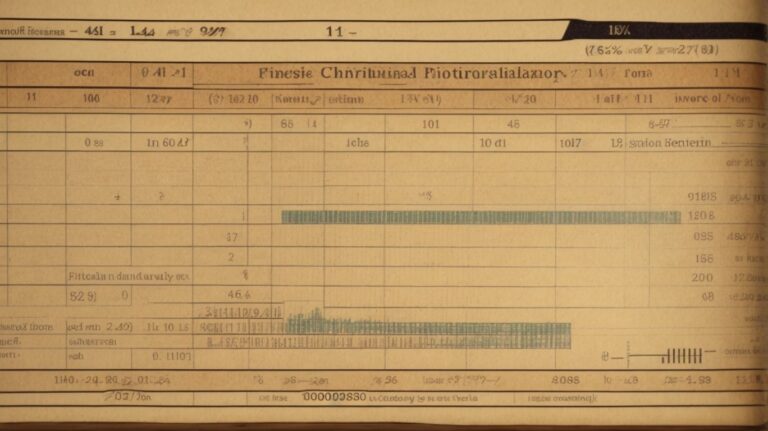Are you considering taking the GRE Psychology Test but not sure where to start? This comprehensive guide has got you covered!
From the format of the exam to the best study resources and effective strategies, we’ll walk you through everything you need to know to ace the test. You’ll also find valuable tips for test day and learn about the benefits of taking the GRE Psychology Test. So, grab a cup of coffee and get ready to become a GRE Psychology Test pro!
Contents
- 1 Key Takeaways:
- 2 What Is the GRE Psychology Test?
- 3 How to Prepare for the GRE Psychology Test?
- 4 What Topics Are Covered on the GRE Psychology Test?
- 5 What Are the Best Tips for Taking the GRE Psychology Test?
- 6 What Are the Benefits of Taking the GRE Psychology Test?
- 7 Frequently Asked Questions
- 7.1 What is the GRE Psychology Test?
- 7.2 What topics are covered in the GRE Psychology Test?
- 7.3 How long is the GRE Psychology Test?
- 7.4 Do I need to have a psychology background to take the GRE Psychology Test?
- 7.5 How is the GRE Psychology Test scored?
- 7.6 Are there any tips for preparing for the GRE Psychology Test?
Key Takeaways:
- Understand the format and scoring of the GRE Psychology Test to better prepare for the exam.
- Use a variety of study resources and effective strategies to cover all topics tested on the GRE Psychology Test.
- Pace yourself, read carefully, use process of elimination, and avoid leaving any questions blank for the best chances of success on the GRE Psychology Test.
What Is the GRE Psychology Test?
The GRE Psychology Test is an exam administered by the Educational Testing Service (ETS) that assesses a student’s readiness for graduate programs in psychology.
This test measures a candidate’s knowledge of various psychological theories, research methods, and statistical procedures. It is designed to evaluate a student’s understanding of core concepts in psychology, such as the biological, cognitive, and social bases of behavior.
Scoring well on the GRE Psychology Test is crucial for aspiring psychology students, as it plays a significant role in the admissions process for graduate programs. Many universities and colleges use GRE scores as a key factor in evaluating applicants for their psychology programs.
Therefore, preparing thoroughly for this exam is essential to increase the chances of gaining admission to competitive graduate programs in psychology.
What Are the Sections of the GRE Psychology Test?
The GRE Psychology Test consists of various sections designed to evaluate a test taker’s knowledge and analytical skills in psychology.
The test contains questions that assess a candidate’s understanding of major concepts, theories, and research methods in psychology. There are sections covering biological, cognitive, social, developmental, and clinical psychology, each focusing on different aspects of the discipline.
The test format includes multiple-choice questions, as well as questions that require analytical reasoning and application of psychological principles.
The test assesses the ability to interpret and evaluate psychological data, synthesize information, and make inferences based on psychological theories and research findings.
How Is the GRE Psychology Test Scored?
GRE Psychology Test scores are determined based on the performance in each section, resulting in scaled scores and percentile ranks that provide insight into the test taker’s achievement compared to others.
The scoring process of the GRE Psychology Test involves converting the raw score for each section into a scaled score, which takes into account the difficulty of the questions.
These scaled scores are then used to calculate the percentile ranks, indicating where the test taker stands in comparison to other test takers.
Understanding scaled scores and percentile ranks is important as they offer a clear picture of how an individual stacks up against the general test-taking population.
The average scores for the GRE Psychology Test vary each year, so comparing these scores can provide context for performance assessment.
How to Prepare for the GRE Psychology Test?
Effective preparation for the GRE Psychology Test is essential for success and involves creating an ETS account, registering for the test, and utilizing study materials and practice resources.
To begin the preparation process, prospective test-takers should first create an ETS account through the official website. After establishing an account, the next step is to navigate through the registration process, selecting a convenient test date and location.
Once the registration is complete, it’s crucial to gather GRE Psychology Test study materials, such as review books, practice tests, and flashcards, to cover the extensive range of topics tested. Utilizing reputable online resources and study aids can further enhance preparedness for the exam.
What Are the Best Study Resources for the GRE Psychology Test?
Several study resources are available for the GRE Psychology Test, including materials provided by the Educational Testing Service, study guides from graduate schools, and paper versions of previous tests.
The GRE Psychology Test can be efficiently prepared for with a comprehensive approach that incorporates both traditional study materials and modern digital resources.
The Official GRE Psychology Test Preparation materials are essential for understanding the test format and question types. These materials offer sample questions and practice tests to familiarize oneself with the content and structure of the exam.
Studying from graduate-level psychology textbooks and reference materials provides in-depth content coverage.
Additionally, online platforms and forums dedicated to GRE Psychology offer valuable insights and discussions on test strategies, along with access to a wide range of practice questions and simulated tests.
What Are the Most Effective Study Strategies for the GRE Psychology Test?
Effective study strategies for the GRE Psychology Test involve a comprehensive review of content, structuring study sessions, utilizing educational resources, and adopting effective test-taking approaches.
Content review should encompass key concepts in psychological history, biological bases of behavior, research methods, social psychology, and more.
Structuring study sessions can be achieved by setting specific goals for each session, utilizing mnemonics and study aids, and integrating practical application through case studies or real-world examples.
Educational resources such as GRE prep books, practice tests, and online forums can offer valuable insights and additional practice materials.
Test-taking tips involve familiarizing oneself with the exam format, time management, applying educated guesses, and maintaining a calm and focused mindset during the test.
What Topics Are Covered on the GRE Psychology Test?
The GRE Psychology Test covers a wide range of topics essential for graduate psychology programs, encompassing biological bases of behavior, cognitive psychology, social psychology, developmental psychology, clinical psychology, and measurement methodology, and other related subjects.
Each of these areas plays a crucial role in understanding the complexities of human behavior, cognition, development, and mental health.
The examination of biological bases of behavior delves into the physiological processes underlying psychological phenomena, while cognitive psychology explores mental processes such as perception, language, and problem-solving.
Social psychology examines how individuals think, feel, and behave in social situations, shedding light on group dynamics and interpersonal relationships.
Developmental psychology focuses on the psychological growth and change that occurs throughout the lifespan, encompassing childhood, adolescence, and adulthood.
Clinical psychology addresses the assessment and treatment of mental illnesses and psychological distress, emphasizing the application of psychological principles to promote emotional well-being and alleviate psychological suffering.
Measurement methodology equips graduate students with the tools and techniques to conduct research, design and analyze studies, and interpret psychological data, fostering critical thinking and empirical research skills essential for scientific inquiry within the field of psychology.
Biological Bases of Behavior
The Biological Bases of Behavior section on the GRE Psychology Test evaluates a test taker’s understanding of the physiological processes and mechanisms underlying behavior, which is crucial for graduate psychology programs.
Topics covered in this section include the structure and function of the nervous system, the endocrine system, genetics, and the physiological mechanisms of sensation, perception, movement, and emotion.
Understanding these topics is crucial for psychologists as it provides insights into the biological underpinnings of various behaviors and mental processes.
This knowledge is essential for crafting effective interventions, treatments, and therapies for individuals dealing with psychological, emotional, or behavioral challenges.
Cognitive Psychology
The Cognitive Psychology section of the GRE Psychology Test examines a test taker’s knowledge of mental processes such as memory, perception, and problem-solving, which are fundamental for graduate psychology programs.
Cognitive psychology focuses on understanding human mental processes and behavior through the study of how individuals perceive, think, and solve problems.
Its relevance to graduate psychology programs lies in providing a solid foundation for students to comprehend the intricacies of the human mind, cognitive development, and behavior.
These are essential components of advanced research and practice, making cognitive psychology a crucial aspect of graduate psychology education.
Social Psychology
The Social Psychology section of the GRE Psychology Test assesses a test taker’s comprehension of social interactions, group dynamics, and behavioral influences, which are essential for graduate psychology programs.
Social psychology, as tested in the GRE Psychology Test, delves into understanding how individuals perceive and interact with others within various social contexts. It evaluates the ability to analyze and interpret social behaviors and their underlying influences.
Graduate psychology programs place a strong emphasis on the knowledge and skills pertaining to social psychology, as it forms the foundation for understanding human behavior within societal and group settings.
Developmental Psychology
The Developmental Psychology section on the GRE Psychology Test evaluates a test taker’s understanding of human development across the lifespan, covering topics such as infancy, childhood, adolescence, and aging, which are vital for graduate psychology programs.
Understanding the complexities of human development is essential for individuals pursuing graduate psychology programs. This allows them to gain valuable insights into the different stages of life.
The examination of developmental psychology on the GRE Psychology Test delves into the cognitive, emotional, and social changes that occur from birth through adulthood.
It requires an in-depth comprehension of the key theoretical perspectives, research methodologies, and significant milestones in human development.
The section assesses an individual’s ability to apply developmental theories to real-world scenarios and critically analyze various factors that influence human growth and behavior.
It also measures the test taker’s knowledge of the impact of cultural, social, and environmental influences on developmental outcomes.
Clinical Psychology
The Clinical Psychology section of the GRE Psychology Test assesses a test taker’s knowledge of assessment, diagnosis, and treatment of psychological disorders, which is essential for graduate psychology programs.
Clinical psychology involves the application of psychological principles to assess and treat various mental health issues, including anxiety, depression, and personality disorders.
Professionals in this field work in diverse settings such as hospitals, mental health clinics, and private practices, offering therapy, conducting assessments, and collaborating with multidisciplinary teams.
Graduate psychology programs emphasize the significance of understanding psychotherapy techniques, research methodologies, and ethical considerations in clinical practice.
Aspiring psychologists often pursue specialized training in areas such as cognitive-behavioral therapy, child and adolescent psychology, or forensic psychology.
Measurement, Methodology, and Other Topics
The Measurement, Methodology, and Other Topics section on the GRE Psychology Test covers research methods, statistical analysis, and other essential areas crucial for graduate psychology programs.
These components are pivotal for evaluating a candidate’s grasp of foundational research principles and data analysis in the context of psychological studies.
Research methods explore the various approaches to conducting psychological research, including experimental, correlational, and observational methods, enabling candidates to demonstrate their understanding of study design and execution.
The section also delves into statistical analysis, testing candidates’ knowledge of key concepts such as probability, inferential statistics, and hypothesis testing.
Given the significance of statistics in psychological research, this component ensures candidates possess the quantitative skills necessary for interpreting and analyzing empirical data.
The inclusion of other essential areas ensures that graduates are equipped with a comprehensive understanding of diverse psychological topics, ranging from psychological disorders and cognitive processes to social psychology and developmental psychology.
Mastery of these varied subjects is essential for a well-rounded education in psychology and prepares candidates for the challenges they may encounter in their professional careers.
What Are the Best Tips for Taking the GRE Psychology Test?
Mastering the GRE Psychology Test requires effective test-taking strategies, including pacing, careful reading, strategic elimination, and avoiding leaving any questions unanswered.
An essential test-taking strategy is to familiarize yourself with the types of questions and the structure of the exam. Practice timed mock tests to get a sense of the pacing required for each section.
It’s crucial to read each question and answer option thoroughly to ensure you understand the context before making your selection.
Strategic elimination can also help narrow down the choices, increasing the chances of selecting the correct answer. Never leave any question unanswered, as there is no penalty for guessing.
Pace Yourself
Pacing is crucial when taking the GRE Psychology Test, as it ensures that test takers can effectively manage their time and complete all sections without rushing or running out of time.
Effective time management allows for thoughtful consideration of each question, reducing the likelihood of hurried or inaccurate responses.
Strategies such as skipping difficult questions and returning to them later, allocating specific time limits for each section, and practicing timed mock tests can aid in honing this skill.
Maintaining focus throughout the test is equally important, minimizing distractions and staying on track with the allotted time per question to optimize performance.
Read Carefully
Careful reading is essential for the GRE Psychology Test, as it enables test takers to comprehend questions thoroughly and select the most appropriate responses based on the given information.
By engaging in careful reading, test takers can decode complex questions more effectively, identify key phrases, and extract essential details. This ultimately enhances their ability to provide accurate responses.
Proper utilization of effective reading strategies can aid in time management, reduce errors, and boost overall test performance.
Use Process of Elimination
Utilizing the process of elimination can aid test takers in narrowing down answer choices and increasing the likelihood of selecting the correct responses on the GRE Psychology Test.
By systematically eliminating answer choices that are clearly incorrect, test takers can focus their attention on the remaining options, improving their chances of arriving at the correct answer.
This strategy not only saves time but also reduces the cognitive load, allowing individuals to navigate through complex questions with more confidence.
Relying on the process of elimination can alleviate the pressure of guessing blindly, as it provides a structured approach to refining options.
For example, when faced with a particularly challenging question, eliminating two out of the four answer choices may significantly enhance the chance of arriving at the right answer, turning a daunting task into a more manageable one.
Don’t Leave Any Questions Blank
Leaving questions unanswered on the GRE Psychology Test can potentially result in missed opportunities for points, making it essential for test takers to attempt all questions to maximize their score potential.
One effective strategy for ensuring that all questions are addressed is to manage time efficiently. By allocating a specific amount of time to each question and sticking to it, test takers can avoid spending excessive time on challenging questions and risk leaving others unanswered.
Additionally, strategic guessing can be employed when uncertain about a particular question, as unanswered questions always result in zero points, while a guessed answer at least holds a chance of gaining credit.
What Are the Benefits of Taking the GRE Psychology Test?
Taking the GRE Psychology Test offers numerous benefits, including demonstrating academic readiness for graduate psychology programs, providing valuable admission credentials, and showcasing proficiency in psychology subject matter.
By taking the GRE Psychology Test, individuals can effectively demonstrate their grasp of the foundational principles, theories, and research methodologies within the field of psychology.
This not only serves as a strong indicator of their preparedness for graduate-level studies but also enhances their application for admission into reputable academic institutions.
Achieving a competitive score on the GRE Psychology Test can significantly bolster one’s credentials, setting them apart as a candidate with a comprehensive understanding of psychological concepts and analytical skills.
This can be especially advantageous when vying for coveted positions in prestigious graduate programs, where a high-level of academic proficiency is a prerequisite.
Successful performance on the GRE Psychology Test reflects an individual’s dedication and commitment to advancing their education and expertise in the field of psychology.
It provides prospective academic institutions with tangible evidence of a candidate’s capability to thrive in a rigorous academic environment, ultimately elevating their credibility and standing as a prospective graduate student.
Frequently Asked Questions
What is the GRE Psychology Test?
The GRE Psychology Test is a standardized exam that assesses a student’s knowledge and understanding of psychology. It is often required for admission to graduate programs in psychology and related fields.
What topics are covered in the GRE Psychology Test?
The GRE Psychology Test covers a wide range of topics, including cognitive, developmental, social, and clinical psychology, as well as research methods and statistics.
How long is the GRE Psychology Test?
The GRE Psychology Test is a computer-based exam that typically takes about three hours to complete. This includes a tutorial, breaks, and the test itself.
Do I need to have a psychology background to take the GRE Psychology Test?
While having a background in psychology may be beneficial, it is not required to take the GRE Psychology Test. The test is designed to assess general knowledge and understanding of the subject, and studying specific content areas is recommended.
How is the GRE Psychology Test scored?
The GRE Psychology Test is scored on a scale of 200-990, with 200 being the lowest score and 990 being the highest. The score is based on the number of correct answers and does not penalize for incorrect answers.
Are there any tips for preparing for the GRE Psychology Test?
Yes, some tips for preparing for the GRE Psychology Test include studying a variety of topics, practicing with sample questions, and familiarizing yourself with the test format. It is also recommended to take a formal GRE test prep course or work with a tutor for personalized assistance.





